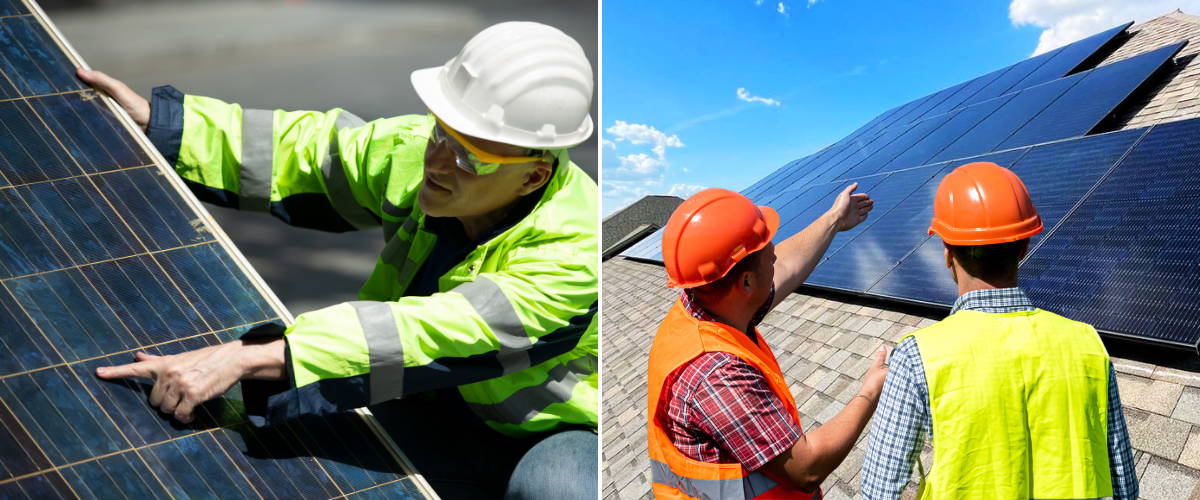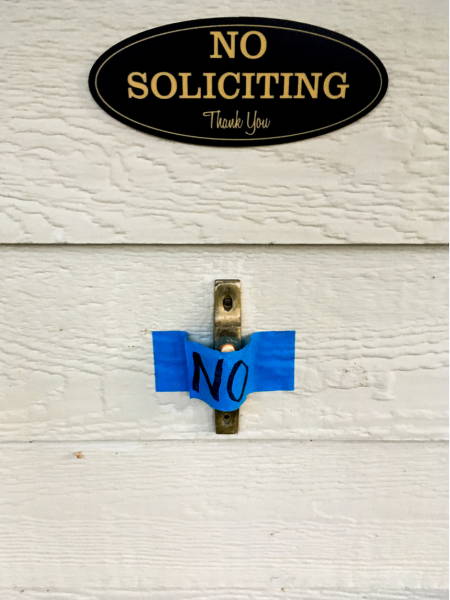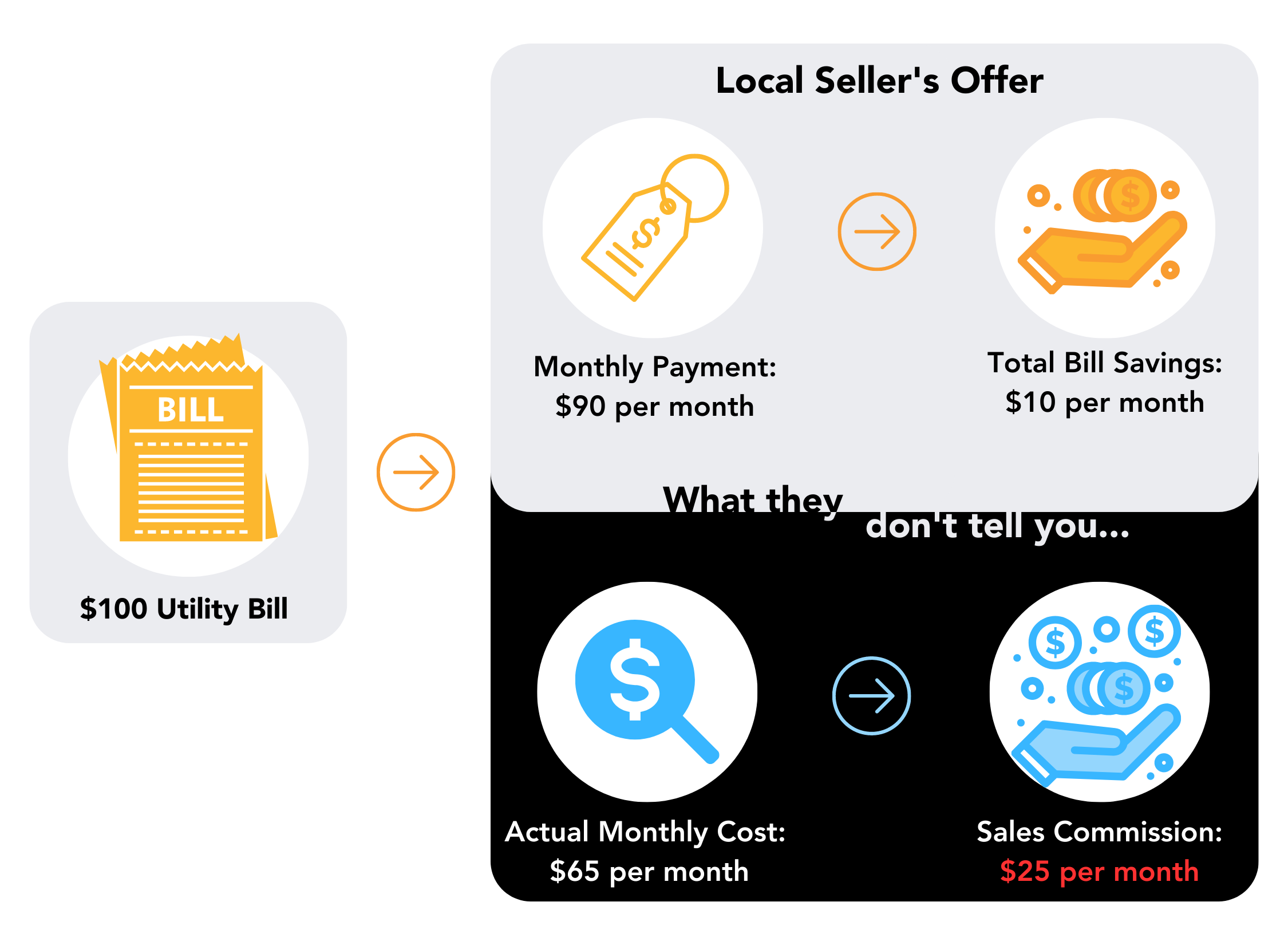The Top 5 Reasons to Avoid "Local" Solar Sellers
When installing a home solar system, it’s essential to make informed decisions. There are thousands of solar sellers in the US, and while local solar sellers may seem like a convenient option (they come right up to your door, most of the time!), there are several reasons why you should exercise caution when choosing a vendor, particularly if they're just an offshoot of a major sales company.
This article will explore the top 5 issues with “local” solar sellers, and explain why a salesman-free seller is usually a better choice.
Equipment Quality
Over-promising is perhaps one of the most well-known issues within the solar industry. A lot of companies tend to tout their equipment as “the best”, but it’s always beneficial to do your own research.
Cheaply made panels, faulty string inverters, and short-term warranties are anything but few and far between: in fact, they’re more common than not for residential solar in the US.
Lower volume restricts local sellers, as they don’t have a low enough cost of goods sold (COGS) to offer premium equipment; at least, not for a competitive price. If they skimp on equipment quality, measly 10-year warranties are pretty typical for cheaper panels and string inverters.
Performance warranties for these panels are pretty grim, too: the panels can degrade at more than twice the standard rate of 0.55%, especially if they’re blue polycrystalline panels. Monocrystalline panels are typically black, and both perform and look much better.
String inverters typically have 10-12-year warranties (at most), and the way they work causes issues with your inverter or even one single panel to shut down your whole system, or at least a large portion of it (if you have a large system with multiple strings & inverters). Microinverters, on the other hand, will pair with each individual panel: even if one panel or inverter goes down, the remainder of the system is unaffected.
Low quality equipment choices yield systems that require more service and equipment replacement, which can drive up costs even more and decimate any solar savings you might have seen in the first place.
More established solar companies can get volume discounts, allowing them to offer higher-quality equipment with longer warranties.

Scammy Sales Tactics
Though it’s definitely a problem with the industry as a whole, local solar pop-ups are one of the biggest culprits when it comes to unethical sales practices.
It’s genuinely shocking how common and transparent these tactics can be, but local solar companies often fall under the radar of the FTC and other organizations that try to protect customers.
Just a few of the most crafty capers we’ve seen include:
- Promising discounts, rebates, or incentives for “free”.
With a hard sell, salespeople sometimes like to offer free swag, gift cards, discounts, etc. in exchange for a signature. Keep in mind that you are still paying for these benefits: the salesperson is simply pulling the cost out of their commission (which YOU pay).
If they are able to give you a $500 hotel credit, how much must they personally be making from your purchase? - Fake “assessment” or “consultation” visits
While you should be skeptical of anything that is promoted as “free”, you should be especially scrupulous regarding solar consultations. Salespeople can weave a web of deception to confuse and convince homeowners.
Let’s face it: salespeople have enough basic solar knowledge, buzzwords, and temerity to believably tell you their “brand new & innovative” systems can capture enough energy to power your entire home around the clock, even with the big sycamore above your roof that blocks the majority of sunlight (sure, Chad...).
Do your research after a solar consultation to verify any questionable claims. Make sure any design you receive includes a legitimate shade report and isn’t a simple pencil sketch. - Masquerading door-to-door reps pretending to be from your power company
Believe it or not, some companies will even use slight variations of utility providers’ names in an attempt to confuse and deceive customers. Then, they'll send salesmen to pretend to be representatives from your power company.
These salesmen leave flyers on your door (or, even worse, knock on it and talk your ear off) about how your power company is requiring a shift to solar, and that they’re offering a “special” on solar installations for a short time.
This is a particularly devious tactic, as it preys most on those that won’t realize what’s happening, like new homeowners or the elderly.
Perhaps the most important thing to remember when dealing with any commissioned salespeople is that they get paid directly from your purchase. Sales commissions motivate sellers to upsell and charge you as much as they can, in the most effective way possible: dishonestly.
Just because someone might spend a lot of time and energy selling to you, it doesn’t mean they deserve your business; especially if they don't have a superior product or service.
Plus, many "local" solar companies are just offshoots of big-name dealers, with none of the same warranties, support, or reliability.

Reliability & Professional Expertise
You’ve probably heard of more than a couple of solar sales companies abruptly going out of business, disappearing after only a few years. Then, they open their doors under a different name, run themselves out of business again with poor policies and service, and pop right back up.
It’s a vicious cycle that’s become a get-rich-quick scheme in the US, especially for greedy solar salesbros who want even higher commissions.
What happens when your solar company goes out of business? Warranty issues become a lot harder to deal with, especially when it comes to labor. You’ll need to find another company that’s willing to service your system, and you will most likely have to pay out of pocket.
The bottom line is that local sellers don’t often have the expertise or resources to provide reliability and peace of mind. Without a track record of proven service, it’s hard to know whether they’ll be available or responsive to any post-install and/or warranty support requests.
High-Pressure
There's a reason that local solar sellers use a door-to-door sales model almost exclusively: it encourages immediate, uninformed decision-making.
Door-to-door sales can lead to pressure tactics that are designed to push consumers into commitments before thoroughly evaluating their options or doing their research.
Without giving you time to look anything over, salespeople tell you that their contract and offer will expire right as they walk out your door. Since solar contracts are usually multiple pages of detailed information, this gives you almost no time to read through.
It also doesn't allow you to shop around and get other quotes to compare your price, which means you can't know if the price you're paying is genuinely competitive.
The "human touch" is valued and often preferred by consumers in sales, which door-knockers take advantage of. However, that human touch gets a bit tiresome when there's an 18-year-old earnestly trying to prevent you from making an informed decision in the living room.

Inflated, Unfair Pricing
It may surprise you, but pricing is something that local solar companies typically do not advertise. Try going to any solar company's website: do you see any listed pricing? Any price per watt information?
The reason for this is that local solar sellers don't usually have a set pricing rate. Each project is priced separately, based on the customer's utility bill, and there's no way to determine whether you're receiving a fair rate.
SPOILER: You're probably not.
The standard practice for solar salesmen is to offer you a system that will offset your utility bill for a monthly payment that is slightly less than your current utility bill. This means that companies can have margins as large as they like.
For example:
Imagine you have a $100 monthly utility bill, and a local solar seller comes to offer a solar system. This system is expected to offset your $100 monthly electricity costs. The system's actual cost is about $65 per month, but, since you don't know, the sales person offers you a loan for $90 per month.
You're still saving $10 per month, but the other $25 per month that you could have saved goes directly into the salesperson and their company's pockets. They're making more from your system than you are.


Project Solar: Solar on Your Terms
After dissecting some local solar sellers' tactics and motivations, they may not be the best option for your solar needs: with questionable equipment quality, unethical/high-pressure sales practices, unreliable service, and high pricing, it's clear that many local solar sellers aren't always interested in offering a beneficial investment.
Project Solar's philosophy involves offering solar at the best price point possible, without compromising on quality - on your terms.
How do we do it? Education, efficiency, transparency, and a set pricing model.
Project Solar's policy against invasive sales outreach translates to no sales commissions, but it also fosters a more trustworthy, transparent environment. We believe that customers should make educated decisions, especially with a solar investment, and we've built a database full of solar knowledge to assist with that.
Our Onboarding Team works with each individual customer to find the right design for them. However, the customer has the final say on everything, and we are more than happy to provide any needed resources or answers to questions.
We offer top-of-the-line equipment, including Tier 1 rated, black-on-black, monocrystalline solar panels that are warrantied for 25 years. The best inverters out there, Enphase microinverters, are bundled into our systems by default; they also include a 25-year warranty, compared to the 10-12-year industry standard for string inverters.
At Project Solar, we use trusted local providers for installations and double-back all equipment warranties, including a 10-year workmanship warranty for Full Install projects. And right now, we’re including our SolarCare™ warranty—a $3,000 value—at no extra cost. This package offers a 25-year production guarantee, 10-year workmanship warranty, and 24/7 system monitoring. Even if your installer or manufacturer can't provide warranty service, Project Solar ensures you're fully covered.
Because of our salesman-free advertising practices, we're able to keep our customer acquisition cost remarkably lower than most companies. In combination with the volume discounts we receive on equipment, this allows us to provide pricing as low as 50% of the national average for solar.
Additionally, we use a set pricing model: unlike most solar companies, we won't inflate our pricing from project to project to bolster profits. We list our pricing structure clearly on our website, including a list of any added costs ("adders") that may apply to your project.
Ready to see some real solar savings? Get started with Project Solar's quote calculator: